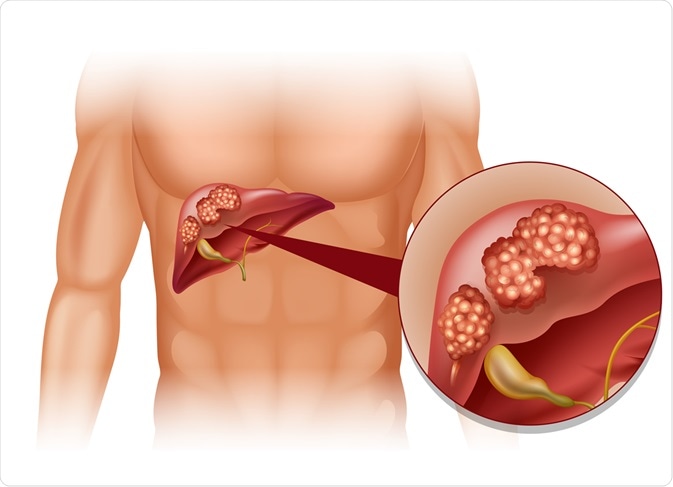What is Liver Cancer?

The liver is located in the upper abdomen and just below the right lung. It is the largest organ inside the human body and is necessary due to its many important functions, some of which include:
- The metabolism and storage of many ingested nutrients (e.g., vitamins and iron).
- The production of clotting factors required to stop bleeding (due to injury).
- The production of bile is key for the assimilation of nutrients.
- The breakdown and removal of toxic substances (e.g., drugs and alcohol) from the bloodstream.
Liver cancer accounts for approximately 1% of all new cancer cases in the UK, making it a relatively uncommon form here. This said, it is the sixth most common cancer worldwide – this variation may be due to the unequal distribution of risk factors, availability and use of screening, and diagnostic methods.

It more commonly affects men than it does women and is strongly related to age, with the highest incidence rates being in older men and women (65 years onwards).
Liver cancer exists in two forms; primary and secondary. The secondary form (also called metastatic liver cancer) is when cancer that first develops in another part of the body spreads to the liver. Conversely, the rarer, primary form occurs when cancer originates in the liver itself.
Unfortunately, most people do not show signs and symptoms until the cancer is at an advanced stage. Even then, these symptoms often tend to be vague and may include:
- Unexplained weight loss
- Depressed appetite
- Abdominal swelling or pain
- Nausea and vomiting
- Abdominal swelling
- Weakness and fatigue
- Jaundice
If liver cancer is suspected, the tests that may be ordered include:
- Abdominal imaging (e.g., CT scan, ultrasound, MRI) – detailed 3D images of the liver are generated.
- Liver biopsy – the removal and testing of a small sample of liver tissue is required to differentiate between a benign and malignant tumor.
- Liver (enzyme) function test.
- Blood tests – liver cancers release a chemical called alpha-fetoprotein (AFP), present throughout pregnancy but declines after birth. It acts as a tumor marker for liver cancer if elevated serum AFP levels are detected in adults.
The exact cause of primary liver cancer is unknown. However, there appear to be risk factors associated with the secondary form. Therefore, measures can be taken to reduce the risk of developing this cancer. These include:
- Moderate (or little) consumption of alcohol – at the very least, a person should avoid drinking more than the recommended daily amount (3-4 units for men, 2-3 units for women)
- A healthy diet and regular exercise regimen
- Prevention and treatment of viral hepatitis (B and C)
These viruses are transmitted between people through:
- The shared use of contaminated needles, for example, in intravenous drug use.
- Through unprotected sex and childbirth, prevention methods include practicing safer sex, such as the sustained use of condoms.
A vaccine to help prevent HBV infection is recommended to reduce the risk of hepatitis and liver cancer. On the other hand, there is no vaccine for HCV, and infection must be controlled by educating the public on how these infections occur.
References:
- http://www.mayoclinic.org/diseases-conditions/liver-cancer/basics/preparing-for-your-appointment/con-20025222
- http://www.cancer.org/cancer/livercancer/overviewguide/liver-cancer-overview-what-is-liver-cancer
- http://www.cancerresearchuk.org/health-professional/cancer-statistics/statistics-by-cancer-type/liver-cancer/incidence#heading-Zero
- http://www.nhs.uk/Conditions/Cancer-of-the-liver/Pages/Diagnosis.aspx
- http://www.webmd.boots.com/cancer/liver-cancer-symptoms-diagnosis-treatment
Further Reading
- All Liver Cancer Content
- Liver Cancer Treatment
- Types of Liver Cancer
- Secondary Liver Cancer
- Radioemobilization for Liver Cancer
Last Updated: Jan 26, 2021

Written by
Afsaneh Khetrapal
Afsaneh graduated from Warwick University with a First class honours degree in Biomedical science. During her time here her love for neuroscience and scientific journalism only grew and have now steered her into a career with the journal, Scientific Reports under Springer Nature. Of course, she isn’t always immersed in all things science and literary; her free time involves a lot of oil painting and beach-side walks too.
Source: Read Full Article